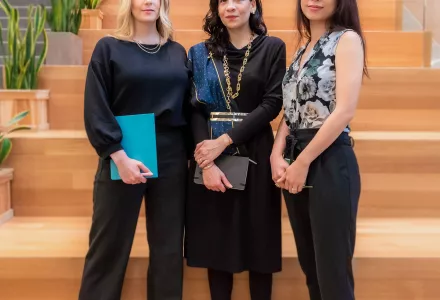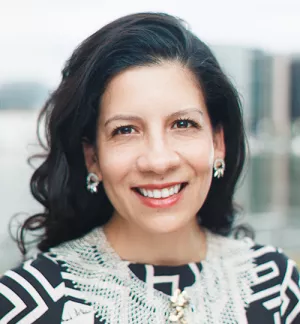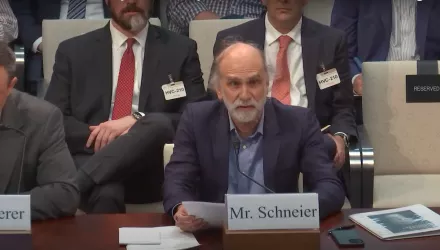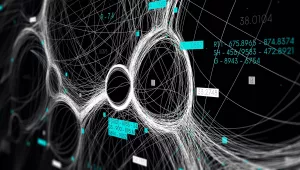
From safeguarding elections to engaging with China’s cyber officials to protecting user data, the Center’s cyber initiatives are working to protect the public from digital dangers and make this technical arena more accessible.
This fall, the Belfer Center named Lauren Zabierek, Maria Barsallo Lynch, and Julia Voo to head three of the Center’s growing cyber-related projects: The Cyber Project, Defending Digital Democracy Project (D3P), and China Cyber Policy Initiative (CCPI), respectively.
“Cyber is an inescapable element of public policy,” said Center Co-Director Eric Rosenbach, a former “cyber czar” for the U.S. Department of Defense. “From hacking and disinformation attacks on our elections and power grids to the intensifying global competition over cyber technology, this is an essential area for research,” he said. “The Belfer Center is pleased to welcome these three exceptionally talented individuals, whose expertise will guide the Center’s work on one of the most challenging areas confronting policymakers in Washington and around the world.”
DEFENDING DIGITAL DEMOCRACY PROJECT (D3P)
Foreign nations and non-state actors are not backing down in their efforts to hack systems, alter the outcome, and undermine confidence in our elections. The Defending Digital Democracy Project (D3P), a bipartisan initiative, has been working since 2017 on strategies, tools, and technology to protect democratic processes and systems from attacks.
Maria Barsallo Lynch, Executive Director of D3P, brings to the project experience in the cross-section of politics, cybersecurity, and technology. She has led funding strategy and program implementation initiatives in the nonprofit and political arenas, including as Deputy Finance Director for U.S. Senator Michael Bennet in Colorado.
“Our electoral system is the bedrock of our most cherished democratic values,” said Barsallo Lynch. “D3P is committed to developing meaningful strategies and tools to safeguard democratic processes in the U.S. and around the world,” she said. “D3P’s incredible team brings together experts, students, and alumni who understand our responsibility to help equip those on the frontline of democracy with tools needed to face evolving threats.”
In anticipation of threats to the 2020 U.S. elections, D3P is working with election officials and others involved in the elections process across the country—from California and New Mexico to Louisana and North Carolina—to identify vulnerabilities and needs of election office staffs. Team experts, including Eric Rosenbach and Debora Plunkett, have testified before Congress about the threats and actions needed to fortify elections.
Adding to the playbooks it has produced for leaders in the democratic process, D3P is currently completing a new Information Operations Playbook and Toolkit with tips and tools to defend against the type of mis/disinformation that state and local elections will most likely encounter. In mid-December,
the D3P team will conduct “Battlestaff Bootcamp” in Washington, D.C. The training aims to bring more than 150 state and local election officials from large and small offices to train on best practices for election day operations. The bootcamp will include a simulation exercise to identify vulnerabilities in current processes and trainings to improve those processes. D3P also is continuing to build a research portfolio to advise policymaking on digital democracy issues such as data and privacy, and developments in election security and information operations.
Find more at belfercenter.org/D3P
THE CYBER PROJECT
The cyber problems that confront today’s leaders are substantial: from protecting a nation’s most critical infrastructure against cyber attacks to preparing a military force for conflicts in cyberspace to reducing vulnerable points of attack without stifling innovation. The Cyber Project aims to become the premier home for rigorous and policy-relevant study of these and related issues.
Lauren Zabierek, Executive Director of the Center’s Cyber Project, is a military veteran, former civilian intelligence analyst, and former commercial cyber security senior analyst and manager. Zabierek served as an intelligence officer in the U.S. Air Force and as a civilian intelligence analyst with the National Geospatial-Intelligence Agency (NGA) assigned to the Office of Counterterrorism.
“The Cyber Project works with policymakers, technologists, practitioners, and academics to help shape policy for better security in this critical space,” Zabierek said. “The overall theme for the year is ‘Cybersecurity is National Security’ and everything we’re doing domestically and internationally aligns with this theme.”
Currently, the Cyber Project is addressing two major challenges: (1) How to shore up defenses and vulnerabilities without stifling innovation or curtailing privacy and freedom; and (2) How to shape the external environment— such as international norms and rules—and engage in technology and security issues with our allies and adversaries. To tackle these challenges, the project has been convening international cyber experts for seminars and workshops, meeting with Congressional members and staff, taking part in Track II dialogues, and engaging students in deep research on critical cyber issues.
Among its current activities, the Cyber Project is exploring ways to help states process and analyze cyber threat intelligence and explore public-private relationships, and is researching best practices in personal cybersecurity. The Project also is working with the Belfer Center’s U.S.-Russia Elbe Group and conducting corresponding research to establish “rules of the road” in cyberspace for the two countries. The Elbe Group meets annually to discuss issues of importance to both countries.
Find more at belfercenter.org/Cyber
CHINA CYBER POLICY INITIATIVE
China’s capabilities and intentions in cyberspace will increasingly have a significant impact on the international community. The goal of the China Cyber Policy Initiative (CCPI) is to promote U.S.-China dialogue on cyber issues and to better understand, analyze, and assess China’s capabilities and intentions, and their potential consequences.
Julia Voo, Research Director of the China Cyber Policy Initiative, worked previously at the British Embassy in Beijing, where she focused on China’s cyber and artificial intelligence policy from a commercial perspective.
“We are in the middle of a great challenge to the current global power balance, a substantial part of which will play out in cyberspace,” Voo said. “CCPI is committed to helping policymakers and business find new areas for collaboration and managing risk.”
In its effort to promote dialogue and better understand China’s cyber efforts, CCPI has organized meetings in the U.S. and in China related to the U.S.-China: Controlling Confrontation in Cyberspace project, a Track II dialogue with the China Institute for International Strategic Studies to facilitate discussion on ways to reduce risks of cyber conflict.
The key to enhancing policymakers’ understanding of the China cyber issue is through placing the problems in context, Voo believes. To that end, CCPI is creating three tools to better inform the international community about China’s role and plans in cyberspace. These include:
• A map of influence and global connectivity to put China’s Digital Silk Road and the potential of growing Chinese influence over global internet infrastructure into context.
• A framework for measuring state cyber power in order to help inform policy discussions and debates on the threats in cyberspace.
• A timeline and map of diplomatic alliances in cyberspace at international, regional, and bilateral levels to get a better understanding of the extent of influence the U.S. and China have in cyberspace and how this may be changing over time.
Because U.S.-China relations in cyberspace are a long-term challenge, Voo encourages policymakers, the press, and the public to invest in building deep expertise in China-related issues rather than focusing solely on immediate areas of friction.
Find more at belfercenter.org/CCPI
Wilke, Sharon. "Charting Cyber's Future." Belfer Center Newsletter. Belfer Center for Science and International Affairs, Harvard Kennedy School (Fall/Winter 2019-2020).










